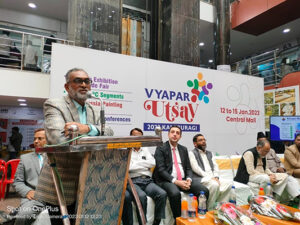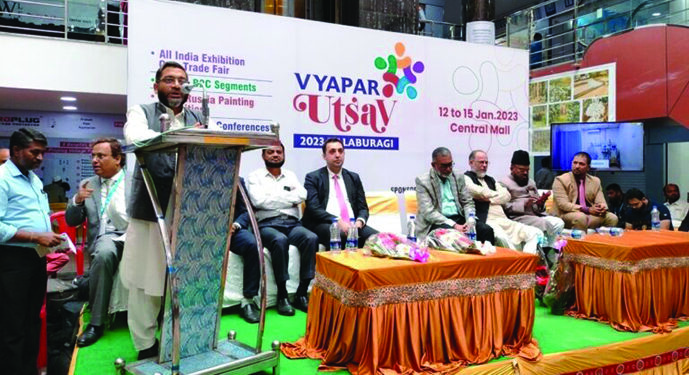KALABURAGI (GULBARGA), JAN 13
Speaking after inaugurating a four -day trade show here on Wednesday, Jamaat-e-Islami Hind president Syed Sadatullah Husaini appealed to people to earn wealth through business by following the Islamic paradigm of business based on honesty and fair practices, and spend it on charity, poor and the needy.
The show has been organized by the Rifah Chamber of Commerce and Industry (RCCI), an association of businessmen and industrialists with its headquarters in New Delhi.
Stating that the Rifah was a movement and its basic objective was to highlight the importance of earning wealth through fair means, the JIH chief said that there were two important pillars of Islamic religion – Zakat and Haj – that could not be performed if one did not have adequate wealth. These two religious deeds were obligatory for only those people who had sufficient surplus money.
“You cannot pay Zakat and perform Haj if you don’t have sufficient money”, the JIH leader said, stressing the importance of money even for performing religious obligations.
He said that out of 10 “ashra mubashshara” (companions of the Prophet Mohammed who were promised Paradise), four – Hazrat Abdurrahman bin Auf, Hazrat Usman bin Affan, Hazrat Talha bin Ubaidullah and Hazrat Zubair – were billionaires. The wealth owned by Hazrat Abdurrahman was worth 100 billion US dollars or Rs. 80,000 crores if calculated based on the current value of the US or Indian currencies.
JIH President said that all that wealth, Hazrat Abdurrahman had acquired through business only. And he spent a big portion of his earnings on charity and in the way of Allah. He left a huge amount of wealth when he died.
Giving the examples of billionaire companions of the Prophet, Mr Husaini said that one of the basic objectives of the Rifah is to revive the traditions of the four companions of the Prophet for the benefit of humanity.
Pointing out that businesses and industry were also a way to achieve sucess in the life Hereafter (aakhirat), the JIH leader appealed to the Muslims to strive for their share in businesses and enterprises.
To substantiate his arguments, Mr Husaini elaborated that the Quran which is the last guidance of Allah revealed for human being through Prophet Mohammed, itself encouraged people to acquire wealth al beit through fair means and spend it for helping others.
Quoting extensively from the Quran, he said that a rich person should return the favour of Allah by spending his wealth on others.
“Don’t forget to earn your share in worldly things, for worldly or mundane things are not only for those who disobey Allah,” the JIH President said, clarifying a major misunderstanding among a vast section of the Muslim population who feel that earning wealth and living a comfortable life is against the principles of Islam. This negative or retrogressive understanding of the teachings of Islam has added to the discouragement of the Muslim community from earning and multiplying wealth.
This attitude of the community has also kept the Muslim community from contributing to growth and development of society, for no development can be carried out without money. Keeping this negative attitude of a sizeable section of the Muslim community, the speech of the JIH chief was very progressive, encouraging and inspirational to motivate the Muslim community to make the best effort to earn money and take part in development of the nation and society. What Mr Husaini said was very much relevant because one could not help others if one did not have money.
Stating that monopoly of a handful of people over business and hoarding or concentration of wealth in only a few hands was a source of “fasad” (mischief), he asked the Rifah members to bring new people in business by training and helping them.
Mr Husaini informed that many Muslim businessmen during the mediaeval period in Istanbul, Jerusalem and Baghdad had wakfed their properties for beautification of their respective cities, indicating how the Muslims of those days cared about civic amenities and aesthetics of their towns and spent money to keep them neat and clean.
Pointing out that trade fair or shows were the “Sunnat” (tradition) of Ambiya (Messengers of Allah), RCCI president S. Ameenul Hasan, said that the trade fairs were introduced by Hazrat Suleman and he used to organize international trade shows in open premises. Quoting from history, Mr Hasan said that Hazrat Suleman had established two sea ports for international trade fair.

Quoting from Islamic scholar Dr Hamidullah’s book, he said that even Prophet Mohammed, a very successful businessman, participated in trade fairs in Yemen and Syria.
Speaking about Rifah’s trade fair here in Gulbarga, he said that trade fairs provided networking which was very important for promoting and scaling up businesses.
He said that Rifah was also working to promote Muslim women in business which was quite clear from many women having set up their stalls in the trade show here. Some businesswoman had come from Mumbai to display their products.
RCCI secretary Afzal Beg said that Muslims generally criticized the business practices in the country but they were themselves not involved actively in business activities to change the rule of the game, that is, to promote fair trade practices, and to stop exploitation of customers. RCCI, he said, is engaged in changing the rule of the game by introducing honest and fair business practices. Mr Beg said the RCCI had participated in trade shows in China and Bangladesh and planned to participate in the Dubai business show the next month.
JIH Karnataka president Dr. Mohammad Saad Belgami, speaking on the occasion, appealed to businessmen to avoid fraud, falsehood, exploitation and hoarding in their business dealings. He also asked them to avoid interest which was a moral crime and a means of exploitation of poor people.
JIH Karnataka secretary Yusuf Kanni asked people to follow the business practices of Hazrat Abdurrahman bin Auf who sold his goods at a very small profit and informed the buyers about the detects, if any, in his products.
Mustafa Kamal Albayrak, Commercial Attache at the Consulate General of Turkey in Mumbai, informed that Turkey annually imported goods worth about 8 billion US dollars from India and exported goods worth about 2.5 billion US dollars.
The programme was conducted by Mr. Aslam Jagirdar, the main brain behind the trade show here.
About 300 stalls were put up by businessmen, traders and manufacturers from different states.
An Indo-Russia painting show was also organized as part of the show to promote art and culture. Among the participants included national awardee Mr. Ayazuddin Patel.
(Syed Khalique Ahmed is the Chief Editor of indiatomorrow.net)










